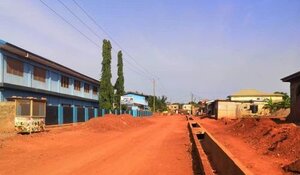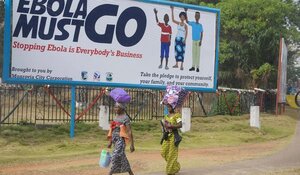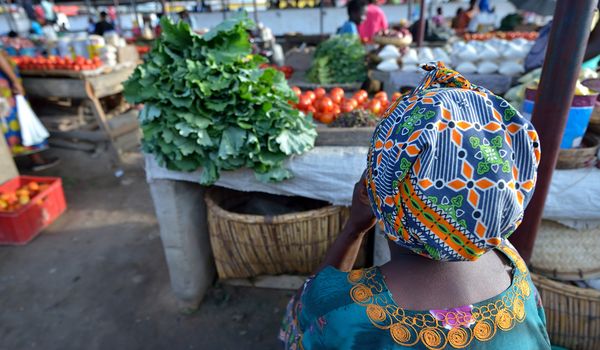By 26 March 2020, the WHO registered 1,808 cases of COVID-19 across 39 African countries. Experts warn that the number of unrecorded cases might be much higher, although thousands of testing kits and trainings for health personnel have been provided by the WHO. Further, the WHO has issued guidelines how to implement measures such as quarantine. But, how can social distancing and staying at home be practiced in informal settlements and tense neighbourhoods? How can people in the informal sector survive during a quarantine? How can one comply with hygiene regulations in places without safe water?
I asked colleagues and friends from Ghana, Liberia and Zambia to share their experiences, observations and concerns. Three countries in quite different situations regarding the stability of the health system and previous emergencies: Liberia is still recovering from the trauma of the Ebola Virus Disease (EVD) epidemic followed by an economic crisis, and the civil war (1989 - 2003). The health system is weak in one of the poorest African countries, reliable laboratories and qualified health personnel are lacking. Fortunately, Liberia has only three reported cases by now. Ghana and Zambia - two relatively stable African countries – are differently affected by the COVID-19 crisis. Ghana has 68 reported cases, two deaths and numbers are increasing quickly, while Zambia reports three cases.
In Ghana and Zambia, schools and universities are on lockdown, all mass gatherings are prohibited, churches and mosques are not operating, markets and providers of local transport are advised to practice social distancing and enhance hygiene procedures. In Liberia, the Ministry of Health has issued a Declaration of Public Health Emergency in the capital and the surrounding county, a staff member from the Independent National Commission on Human Rights (INCHR) tells me. It includes closing schools and the prohibition of large gatherings of any kind; funerals and weddings are only to be attended by no more than 10 people. The declaration further states that “absolutely, no street selling by both adults and children” is allowed and “all residents and marketeer are required to practice social distancing” for the next 21 days. The prohibition of street selling and limitations in markets will have life-threatening effects to families who dependent on that small income. Social distancing and improved hygiene procedures are rather difficult when thinking of the lack of sanitary facilities and the limited space in local markets e.g. in Ghana’s capital Accra or Liberia’s Monrovia.
Fear of the immediate and long-term effects

Looking at more than 150.000 people who lost their jobs in Austria within ten days, one can only image the effects in African countries where an estimated 70 to 90 percent of workers are engaged in the informal economy, the majority without any savings. Street vendors, petty good and service traders, farmers, seasonal workers or domestic workers have little protection under labor laws, no health insurance, paid sick and maternity/paternity leave or pension. Many face unsafe working conditions and are rarely represented in a labor union. “Poverty will rise. People, particularly those working in the informal economy, will suffer from the measures”, Busiku Kaunda, lecturer in development studies at the Copperbelt University in Zambia, worries.
“Not everyone is following the measures considering that the economy is as bad as it is. Particularly if people depend on some small income for their everyday lives”, says Rhoda Ngoma, student of Tourism and Hospitality Studies in Lusaka, and continues, “my mother is an entrepreneur in town and we depend on her income on our everyday lives. Now that fewer people are getting into town, business is slow and she is risking her health by getting into town.”
Rhoda Ngoma and Busiku Kaunda also report that the prizes for groceries such as milling meal as well as hand sanitizer, spirit and glycerine have gone up and that the dollar to Zambian Kwacha rate keeps increasing daily. “We fear that our already stressed and poorly funded health system will not be able to cope with a pandemic. Also, the closing of borders will have huge effects on us since we are dependent on imports such as food and medical supply”, says Kaunda.
“The suspension of all social gatherings has put a hold on our educational system. As a developing country, we are only getting used to online platforms and are not prepared for this.” James Amefi and Gideon Asare, students in Accra write to me and further report that the internet connection is already poor and got worse in the last two weeks, power cuts are becoming more frequent in Ghana as well as in Zambia.
In Liberia, people know very well what it means to face a public health emergency. In the years 2014/2015 at least 4,809 people died from Ebola Virus Disease (EVD) and suffered from a complete breakdown of the heath system, followed by an economic crisis and a standstill of the educational system. “Still, the general atmosphere among the population is relatively calm”, says the colleague of INCHR.
The gendered impacts of a health emergency - Experiences from Liberia

Infectious diseases exacerbate existing gender disparities and socio-economic vulnerabilities. In Liberia, the Ebola crisis had different effects on women and girls than it had on men and boys. Conducting research in Liberia briefly after the country was declared “Ebola-free” in 2015, and working there in 2016/2017, I could witness the immediate and long-term gendered effects.
Women working in the informal sector, particularly in farming, small businesses and cross-border trade lost their livelihoods. Further, many women faced an increased risk to get infected due to their role as caretakers for the sick at home and in the hospitals. An increased number of violence against women and girls has been reported due to isolation by quarantine; as well as the lack of security, disruption of social services; increase of poverty; the interruption of programs and special courts for victims, as well as the closing of schools. Further, Ebola rolled back the access to reproductive healthcare in the region and increased maternal mortality rates. After schools were closed for almost a year, many girls were not able to go back to school due to various reasons. Many girls, whose families were affected by Ebola, became responsible for the family income and for taking care of younger siblings. Community members and local NGOs talked about an increase of teenage pregnancies.
Need for rapid and gender-sensitive response
African countries are relatively early in implementing COVID-19 measures. The question is whether they would be able to cope with the effects on the heath system, the economy and the society. Jeff Chomba Kapisha, student of nursing in Lusaka, Zambia says, “I think it is important to communicate to the world about the particularly vulnerable situation in poor countries, to sensitize the citizens how the virus is spread and how to protect themselves, and to guarantee enough funding for the necessary hygiene products and make them available for children and elderly as they are those most at risk.”
After the Ebola crisis in West Africa, the African Development Bank stated: “It is impossible to build resilience to […] future infectious disease shocks in households and communities without also addressing systemic gender inequality”. This does not only apply for African countries, but also for the Global North (26 March 2020).

